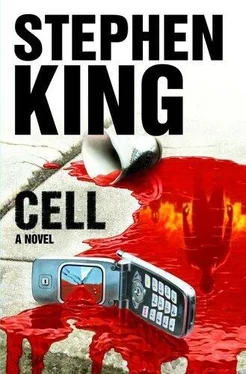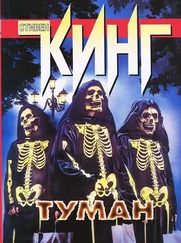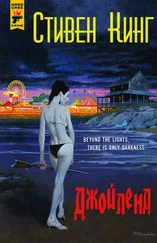"Yeah, baby!" Jordan said. He raised his fists to the sides of his head and shook them, looking really alive for the first time since leaving Cheatham Lodge. "For the Head!"
"I think not," Tom said.
"Afraid of trying their patience?" Clay asked. He was surprised to find himself actually sort of in favor of Alice's crazy idea. That torching another flock was a crazy idea he had no doubt, but . . .
He thought, I might do it just became that's the absolute worst version of "Misty" I've ever heard in my life. Twist my fuckin arm.
"Not that," Tom said. He seemed to be thinking. "Do you see that street there?" He was pointing to an avenue that ran between the mall and the cemetery. It was choked with stalled cars. Almost all of them were pointed away from the mall. Clay found it all too easy to imagine those cars full of people trying to get home after the Pulse. People who would want to know what was happening, and if their families were all right. They would have reached for their car phones, their cell phones, without a second thought.
"What about it?" he asked.
"Let us stroll down there a little way," Tom said. "Very carefully."
"What did you see, Tom?"
"I'd rather not say. Maybe nothing. Keep off the sidewalk, stay under the trees. And that was one hell of a traffic jam. There'll be bodies."
There were dozens rotting their way back into the great scheme of things between Twombley Street and the West Side Cemetery. "Misty" had given way to a cough-syrup rendition of "I Left My Heart in San Francisco" by the time they reached the edge of the trees, and they could again see the red eyes of the boombox power lamps. Then Clay saw something else and stopped. "Jesus," he whispered. Tom nodded.
"What?" Jordan whispered. "What?"
Alice said nothing, but Clay could tell by the direction she was looking and the defeated slump of her shoulders that she'd seen what he had. There were men with rifles standing a perimeter guard around the cemetery. Clay took Jordan's head, turned it, and saw the boy's shoulders also slump.
"Let's go," the kid whispered. "The smell's making me sick."
7
In melrose corner, about four miles north of rochester (they could still see its red glow waxing and waning on the southern horizon), they came to another picnic area, this one with a little stone firepit as well as picnic tables. Clay, Tom, and Jordan picked up dry wood. Alice, who claimed to have been a Girl Scout, proved her skills by making a neat little fire and then heating three cans of what she called "hobo beans." As they ate, two little parties of pilgrims passed them by. Both looked; no one in either group waved or spoke.
When the wolf in his belly had quieted a little, Clay said, "You saw those guys, Tom? All the way from the mall parking lot? I'm thinking of changing your name to Hawkeye."
Tom shook his head. "It was pure luck. That and the light from Rochester. You know, the embers?"
Clay nodded. They all did.
"I happened to look over at that cemetery at just the right time and the right angle and saw the shine on a couple of rifle-barrels. I told myself it couldn't be what it looked like, that it was probably iron fence-palings, or something, but. . ." Tom sighed, looked at the rest of his beans, then put them aside. "There you have it."
"They were phone-crazies, maybe," Jordan said, but he didn't believe it. Clay could hear it in his voice.
"Phone-crazies don't do the night shift," Alice said.
"Maybe they need less sleep now," Jordan said. "Maybe that's part of their new programming."
Hearing him talk that way, as if the phone people were organic computers in some kind of upload cycle, never failed to give Clay a chill.
"They don't do rifles, either, Jordan," Tom said. "They don't need them."
"So now they've got a few collaborators taking care of them while they get their beauty rest," Alice said. There was brittle contempt on top of her voice, tears just beneath. "I hope they rot in hell."
Clay said nothing, but he found himself thinking of the people they had met earlier that night, the ones with the shopping carts—the fear and loathing in the voice of the man who had called them the Gaiten bunch. He might as well have called us the Dillinger gang, Clay thought. And then he thought, I don't think of them as the phone-crazies anymore; now I think of them as the phone-people. Why is that? The thought that followed was even more uncomfortable: When does a collaborator stop being a collaborator? The answer, it seemed to him, was when the collaborators became the clear majority. Then the ones who weren't collaborators became . . .
Well, if you were a romantic, you called those people "the underground." If you weren't a romantic, you called them fugitives.
Or maybe just criminals.
They pushed on to the village of Hayes Station and stayed the night at a tumbledown motel called Whispering Pines. It was within sight of a sign reading ROUTE 19, 7 MI SANFORD THE BERWICKS KENT POND.they didn't leave their shoes outside the doors of the units they chose.
There no longer seemed any need of that.
8
He was standing on a platform in the middle of that damned field again, somehow immobilized, the object of every eye. On the horizon was the skeletal shape with the blinking red light on top. The place was bigger than Foxboro. His friends were lined up with him, but now they weren't alone. Similar platforms ran the length of the open area. On Tom's left stood a pregnant woman in a Harley-Davidson T-shirt with cutoff sleeves. On Clay's right was an elderly gent—not in the Head's league, but getting there—with graying hair pulled back in a ponytail and a frightened frown on his horsey, intelligent face. Beyond him was a younger man wearing a battered Miami Dolphins cap.
Clay saw people that he knew among the thousands and wasn't surprised—wasn't that how things always went in dreams? One minute you were phone-booth-cramming with your first-grade teacher; a minute later you were making out with all three members of Destiny's Child on the observation deck of the Empire State Building.
Destiny's Child wasn't in this dream, but Clay saw the naked young man who had been jabbing the car aerials (now dressed in chinos and a clean white T-shirt), and the guy with the packsack who had called Alice little ma'am, and the limping grandmotherly type. She pointed to Clay and his friends, who were more or less on the fifty-yard line, then spoke to the woman next to her . . . who was, Clay observed without surprise, Mr. Scottoni's pregnant daughter-in-law. That's the Gaiten bunch, the limping grandmotherly type said, and Mr. Scottoni's pregnant daughter-in-law lifted her full upper lip in a sneer.
Help me! called the woman on the platform next to Tom's. It was Mr. Scottoni's daughter-in-law she was calling to. I want to have my baby the same as you! Help me!
You should have thought of that while there was still time, Mr. Scottoni's daughter-in-law replied, and Clay realized, as he had in the other dream, that no one was actually talking. This was telepathy.
The Raggedy Man began making his way up the line, putting a hand over the head of each person he came to. He did this as Tom had over the Head's grave: palm extended, fingers curled in. Clay could see some sort of ID bracelet flashing on the Raggedy Man's wrist, maybe one of those medical-alert things, and realized there was power here—the light-towers were blazing. He saw something else, as well. The reason the Raggedy Man could reach above their heads even though they were standing on platforms was because the Raggedy Man wasn't on the ground. He was walking, but on four feet of thin air.
Читать дальше








